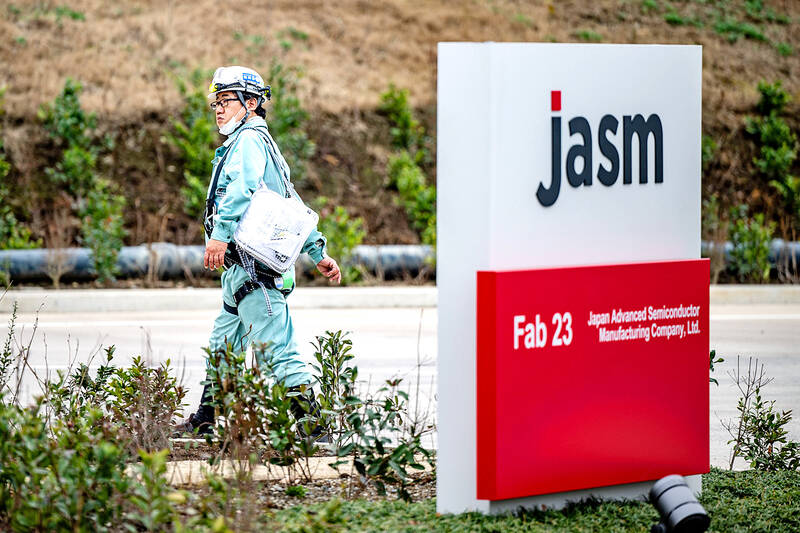The Department of Investment Review approved TSMC’s investment applications on the basis that Taiwan remains a major technology and manufacturing hub for the chipmaker, which makes its most advanced chips at home, the company operates its research-and-development center here and the majority of its capacity remains in Taiwan.
The latest capital injections — US$5.26 billion for its Japanese venture Japan Advanced Semiconductor Manufacturing Inc and US$5 billion for TSMC Arizona Corp — would help the chipmaker deepen its partnerships with local supply chains and recruitment of skillful talent, the department said in a statement.

A worker walks outside a new plant of Japan Advanced Semiconductor Manufacturing Co,
a subsidiary of Taiwan Semiconductor Manufacturing Co, in Kikuyo, Japan, on Feb. 14.
That would help safeguard the nation’s semiconductor industry’s competitiveness in the long term, the statement said.
TSMC’s second Arizona fab is to upgrade its process technology to 2 nanometers to support customers’ strong demand for artificial intelligence (AI) in addition to 3-nanometer technology, the world’s biggest contract chipmaker told investors in April.
The new Arizona fab is to enter volume production in 2028, about three years after the first Arizona fab ramps up production in the first half of next year, which was pushed back from an earlier schedule of late this year due to a lack of sufficient technicians and skilled workers.
The second Kumamoto fab is designed to produce chips from 6-nanometer to 40-nanometers used in automotive, industrial and high-performance-computing applications, TSMC said.
The construction is to start in the second half of this year, with volume production targeted by the end of 2027, it said.
The first fab in Kumamoto is to enter volume production of 12-nanometer, 16-nanometer, 22-nanometer and 28-nanometer chips in the fourth quarter of this year as scheduled, the chipmaker said.
Wire and cable maker Walsin Lihwa Corp (華新麗華) yesterday also won approval to invest US$160 million in its fully owned subsidiary in Singapore, Walsin Singapore Pte Ltd.
The department yesterday also gave the go-ahead to electronic components supplier Lite-On Technology Corp’s US$89.38 million plan to acquire equities of Japan’s Cosel Co (光寶科技), a producer of power supplies and noise filters.
The investment would allow Lite-On to indirectly own Cosel’s four Chinese units, the department said.
Taipei Times / Lisa Wang
TSMC’s second Arizona fab is to upgrade its process technology to 2 nanometers to support customers’ strong demand for artificial intelligence (AI) in addition to 3-nanometer technology, the world’s biggest contract chipmaker told investors in April.
The new Arizona fab is to enter volume production in 2028, about three years after the first Arizona fab ramps up production in the first half of next year, which was pushed back from an earlier schedule of late this year due to a lack of sufficient technicians and skilled workers.
The second Kumamoto fab is designed to produce chips from 6-nanometer to 40-nanometers used in automotive, industrial and high-performance-computing applications, TSMC said.
The construction is to start in the second half of this year, with volume production targeted by the end of 2027, it said.
The first fab in Kumamoto is to enter volume production of 12-nanometer, 16-nanometer, 22-nanometer and 28-nanometer chips in the fourth quarter of this year as scheduled, the chipmaker said.
Wire and cable maker Walsin Lihwa Corp (華新麗華) yesterday also won approval to invest US$160 million in its fully owned subsidiary in Singapore, Walsin Singapore Pte Ltd.
The department yesterday also gave the go-ahead to electronic components supplier Lite-On Technology Corp’s US$89.38 million plan to acquire equities of Japan’s Cosel Co (光寶科技), a producer of power supplies and noise filters.
The investment would allow Lite-On to indirectly own Cosel’s four Chinese units, the department said.
Taipei Times / Lisa Wang
